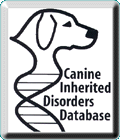
Masticatory muscle myositis - eosinophilic myositis
This disease affects the masticatory muscles - the large muscles on the top and sides of the head which act to close the jaw. These muscles have a unique muscle protein composition. Masticatory muscle myositis is an immune-mediated disease in which the body’s immune system attacks the unique muscle protein found in the masticatory muscles. This causes the muscles to become painful and swollen initially, and the muscles will atrophy as the disease progresses. Opening the mouth is particularly painful.
Unknown.
Many dogs affected with masticatory muscle myositis will improve with drug therapy.
Your veterinarian will suspect this disease if your dog has painful, swollen masticatory muscles, with pain on opening the jaw. The diagnosis can be confirmed with a muscle biopsy to examine the cells with a microscope. Special techniques may be used to test for specific antibodies.
Affected dogs are usually treated medically, with glucocorticoids such as prednisone. Most dogs improve with drug therapy, although the treatment may be long-term.
Affected animals should not be bred.
FOR MORE INFORMATION ABOUT THIS DISORDER, PLEASE SEE YOUR VETERINARIAN.
Kornegay JN. 1995. Disorders of the skeletal muscles. In EJ Ettinger and EC Feldman (eds) Textbook of Veterinary Internal Medicine, p.727-736. WB Saunders Co., Toronto.
Ackerman L. 1999. The Genetic Connection: A Guide to Health Problems in Purebred Dogs, p. 121. AAHA Press,Lakewood, Colorado.
- (Disorder) related terms:
- Disorder Type:

